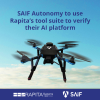Rapita Systems S.L.

Multicore experts based in Barcelona
- Platform analysis
- RapiDaemon interference generators
About Rapita Systems S.L.
Rapita Systems S.L. (RSS) delivers solutions to verify and certify the software timing behavior of multicore processors in safety-critical embedded settings. This groundbreaking technology was pioneered at the BSC-CNS and is now mature and available commercially to industry via Rapita's MACH178 solution.
RSS was formed when Maspa Technologies S.L. was acquired by Danlaw Inc., Rapita Systems' parent company. Read more here.

Solutions
As Rapita Systems' Hardware Centre of Excellence, RSS provides a range of services and tools to support multicore verification, including platform analysis, RapiDaemon interference generators and contention modeling. These solutions are used to identify and measure the impact that interference can have on multicore-hosted software applications.
The solutions provides by RSS form a cornerstone of the MACH178 and Multicore Timing solutions, which provide a pathway to certifying the next generation of multicore embedded avionics and automotive systems.
Case study: Airbus
Rapita Systems S.L., then operating as Maspa Technologies S.L., played a key role in Airbus’ successful certification of the first ever ‘fully-automatic air-to-air refueling (A3R) operation with a boom system’. Timing analysis and characterization services were provided to Airbus that were key to building a certification argument for this advanced multicore avionics system.

Platform analysis
The verification of increasingly complex multicore COTS SoCs is a common challenge for embedded time-critical systems, which requires a detailed understanding of the hardware platform being used. Understanding a platform in enough depth to support verification, especially for projects undergoing DO-178C or similar certification, requires specialist knowledge.
The Rapita Systems S.L. team are world-leading specialists in understanding multicore platforms, with decades of experience in computer architecture and performance analysis.

This gives them the expertise needed to distil platform information from extensive (often 1,000s of pages long) technical reference manuals into actionable insights that support key activities including the following:
- Critical Configuration Settings (CCS) Analysis
- Interference Channel (IC) Analysis
- Hardware Event Monitor Analysis and Validation

RapiDaemons for analyzing timing interference
Qualifiable interference generators are at the heart of multicore timing analysis solutions. Rapita Systems S.L. (RSS) builds on long-term expertise in the design and deployment of specialized interference generators for timing analysis and identification of performance bottlenecks. Rapita Systems interference generators, developed by RSS, are sold as "RapiDaemons".
RapiDaemons are simple, well-crafted pieces of code that operate at the lowest interface between hardware and software. They are designed and refined to stress specific interference channels through applying contention on shared hardware resources.
Contention on shared hardware resources is a common source of interference in multicore platforms, as when a resource arbitrates multiple simultaneous requests, this can cause timing delays. RapiDaemons are designed to generate specific activities on specific shared resources, triggering a predefined effect on a specific interference channel with minimal impact on other interference channels. This supports the application of various verification methodologies for multicore systems.

 Rapita System Announces New Distribution Partnership with COONTEC
Rapita System Announces New Distribution Partnership with COONTEC
 Rapita partners with Asterios Technologies to deliver solutions in multicore certification
Rapita partners with Asterios Technologies to deliver solutions in multicore certification
 SAIF Autonomy to use RVS to verify their groundbreaking AI platform
SAIF Autonomy to use RVS to verify their groundbreaking AI platform
 What does AMACC Rev B mean for multicore certification?
What does AMACC Rev B mean for multicore certification?
 How emulation can reduce avionics verification costs: Sim68020
How emulation can reduce avionics verification costs: Sim68020
 Multicore timing analysis: to instrument or not to instrument
Multicore timing analysis: to instrument or not to instrument
 How to certify multicore processors - what is everyone asking?
How to certify multicore processors - what is everyone asking?
 Certifying Unmanned Aircraft Systems
Certifying Unmanned Aircraft Systems
 DO-278A Guidance: Introduction to RTCA DO-278 approval
DO-278A Guidance: Introduction to RTCA DO-278 approval
 ISO 26262
ISO 26262
 Data Coupling & Control Coupling
Data Coupling & Control Coupling
 DASC 2025
DASC 2025
 DO-178C Multicore In-person Training (Fort Worth, TX)
DO-178C Multicore In-person Training (Fort Worth, TX)
 DO-178C Multicore In-person Training (Toulouse)
DO-178C Multicore In-person Training (Toulouse)
 HISC 2025
HISC 2025










